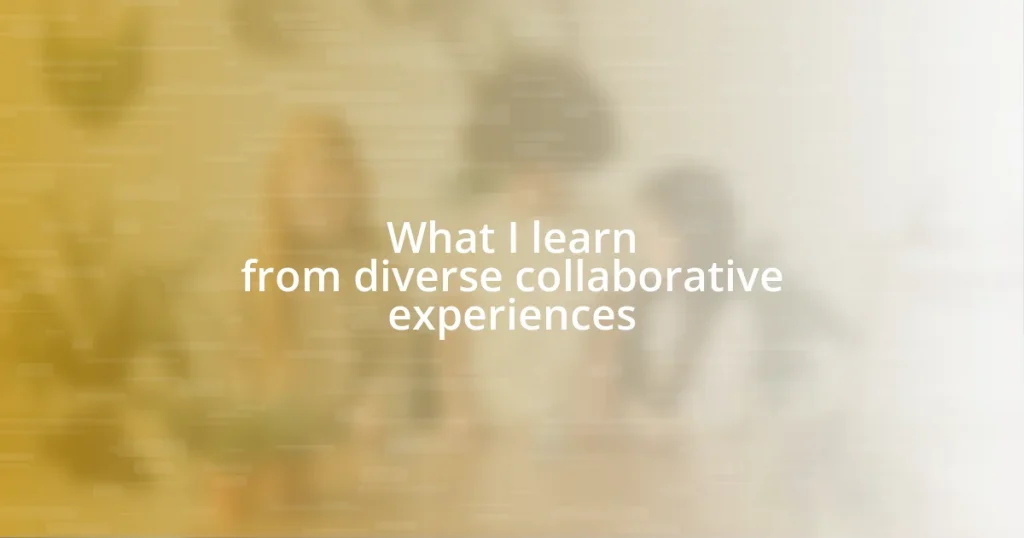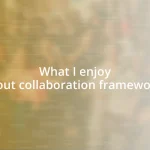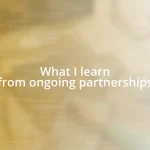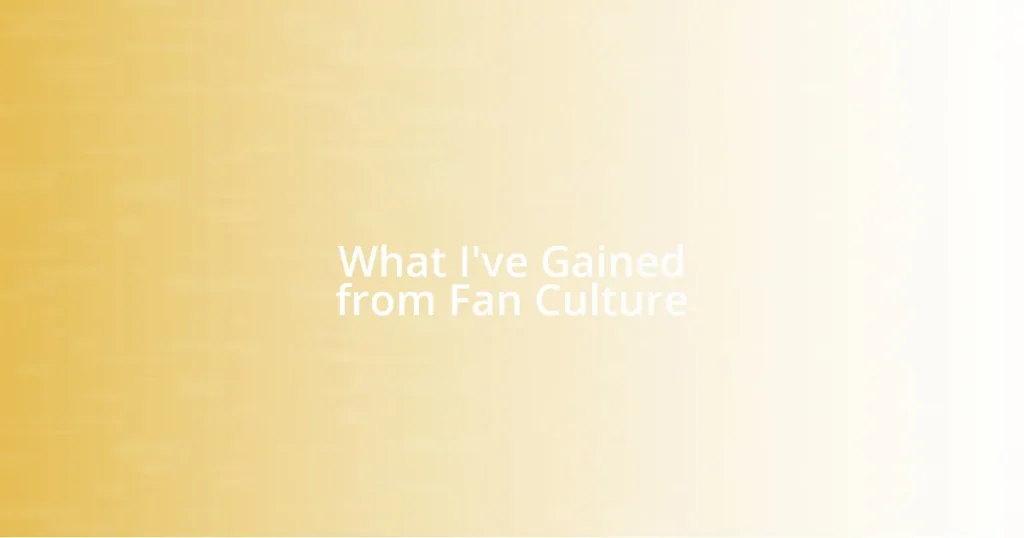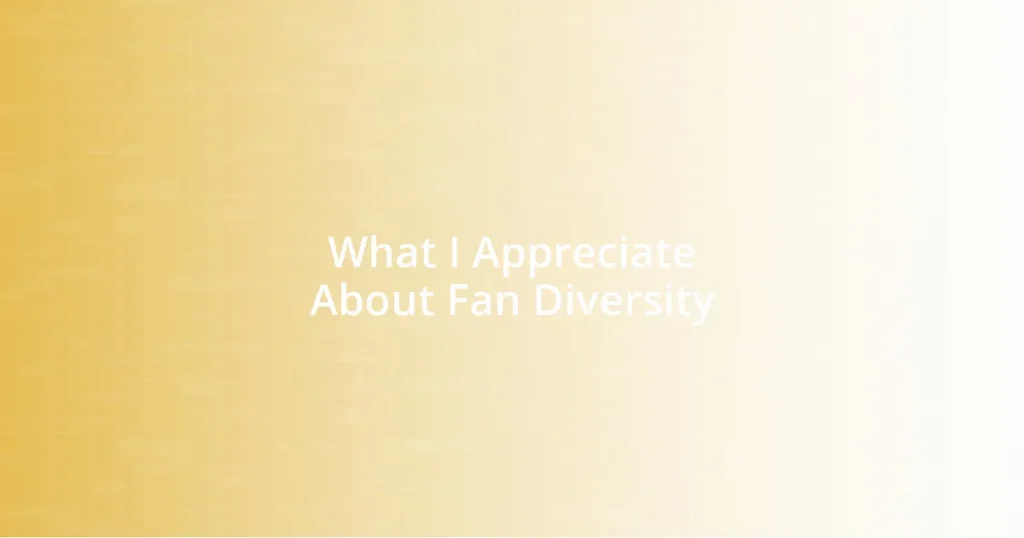Key takeaways:
- Diverse perspectives in collaboration can lead to innovative solutions and foster personal growth through understanding different viewpoints.
- Building trust and embracing vulnerability within teams enhances communication, creativity, and the overall collaborative experience.
- Effective collaboration requires clear communication, flexibility, and a willingness to address conflicts, turning challenges into opportunities for innovation.
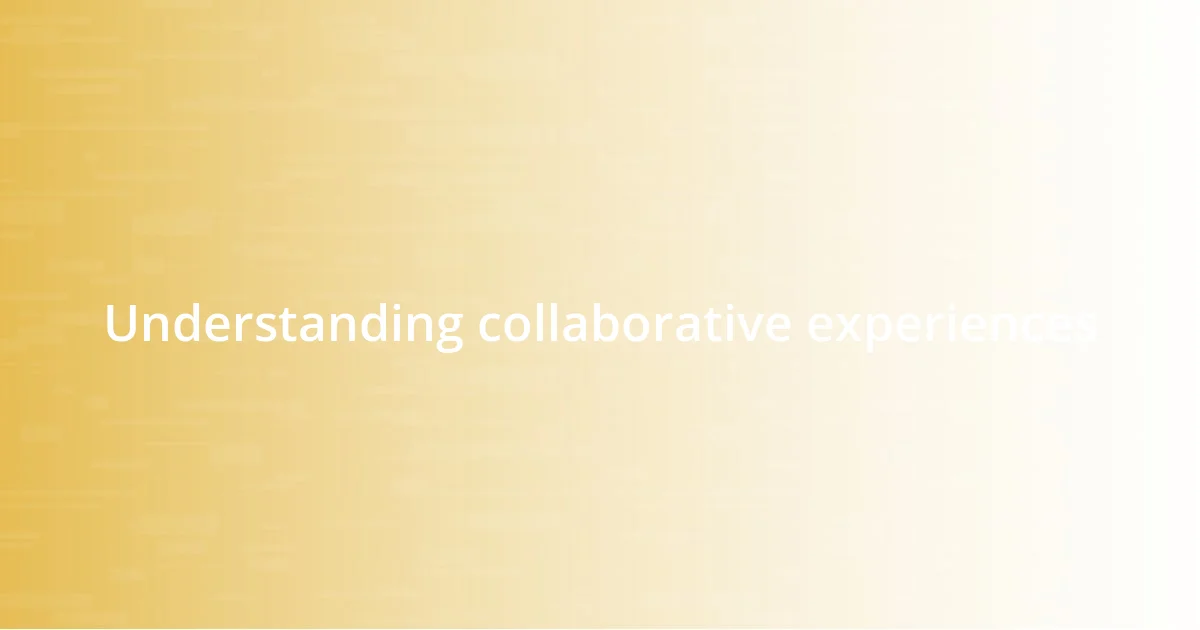
Understanding collaborative experiences
Collaborative experiences are often where the magic happens. I remember a project at work where diverse perspectives clashed beautifully. At first, it felt chaotic, but as we shared ideas, I realized each viewpoint had its own value, creating a richer outcome than I could’ve imagined. Isn’t it fascinating how different backgrounds can lead to innovative solutions?
When you engage in collaboration, the learning curve can be steep. During a group endeavor with international colleagues, I encountered challenges in communication due to cultural differences. It was eye-opening to understand that what I considered straightforward might confuse someone else. This kind of experience isn’t just about completing tasks—it’s about connecting on a deeper level and learning to appreciate varied ways of thinking. Have you ever found yourself in a similar situation?
Through my collaborations, I’ve discovered that vulnerability fosters trust. There was a moment in a brainstorming session when I hesitated to share an idea, fearing it might be poorly received. To my surprise, when I finally spoke up, it resonated with others, leading to a collaborative breakthrough. This taught me that embracing vulnerability can not only enhance teamwork but also enrich the entire experience, don’t you think?

Importance of diversity in collaboration
Diversity in collaboration is essential because it brings a multitude of perspectives to the table. I remember a time when I worked on a project with team members from five different countries. The contrasting viewpoints not only led to creative solutions but also expanded my understanding of cultural nuances. Each interaction was like a window into a different world, making me realize how deeply our backgrounds shape our thoughts and approaches.
I’ve often found that diverse teams are more innovative. When I collaborated with a group of professionals from various disciplines, our brainstorming sessions felt electric. People brought different expertise and experiences, allowing us to tackle problems from unique angles. This diversity ignited inspiration and made it clear that a mix of ideas can lead to breakthroughs that I never would have conceived on my own. Have you experienced anyone challenging your thoughts during team discussions? It can be uncomfortable, but it ultimately leads to stronger outcomes.
The emotional dynamics in diverse collaborations can also lead to personal growth. I recall a situation where I had to engage with a colleague whose views seemed completely alien to me. At first, it was frustrating, but as I invested myself into understanding their perspective, I realized that this discomfort was a sign of growth. Embracing these differences fosters empathy and encourages a culture where every voice matters, enhancing not just the projects we work on, but also our personal development.
| Benefits of Diversity | Impact on Collaboration |
|---|---|
| Broader Perspectives | Leads to innovative ideas |
| Enhanced Problem-Solving | Encourages creative solutions |
| Emotional Growth | Fosters empathy and understanding |
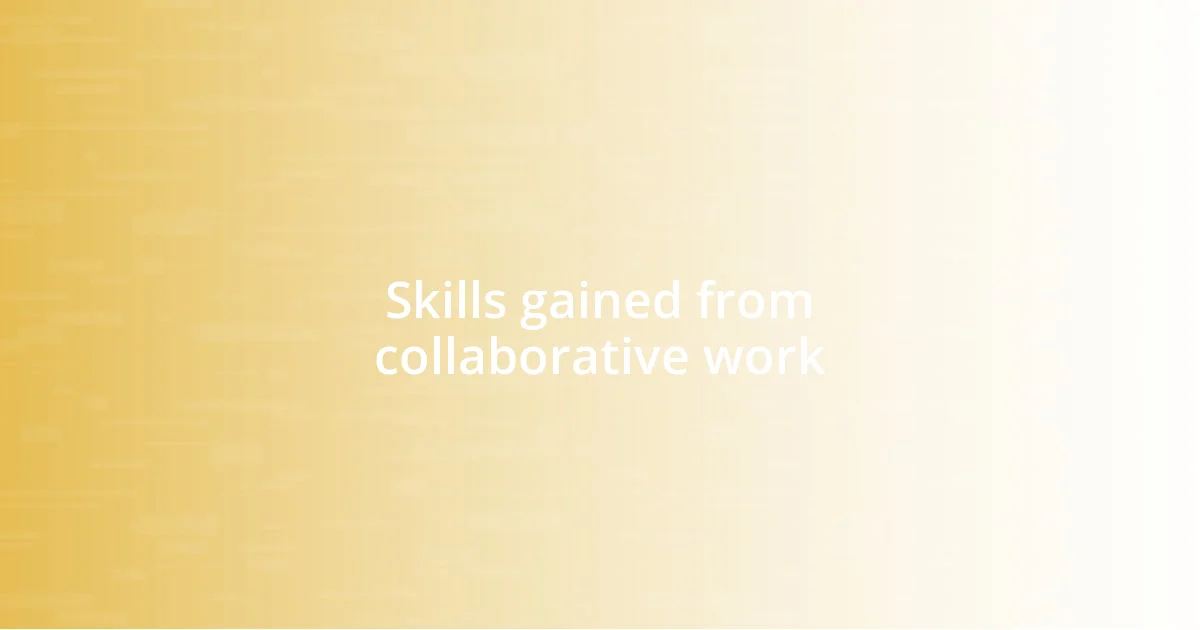
Skills gained from collaborative work
Engaging in collaborative work has allowed me to acquire a variety of invaluable skills. For instance, during a recent project, I was surprised by how much my active listening improved. Initially, I focused on voicing my own ideas, but I quickly learned that giving attention to others’ thoughts fostered a supportive environment where everyone felt heard. It’s remarkable how this simple act can shift dynamics and lead to more effective problem-solving.
Some essential skills gained from collaborative work include:
- Communication Skills: I can articulate thoughts clearly and understand others better.
- Conflict Resolution: Navigating disagreements has honed my ability to find common ground.
- Teamwork: Learning to rely on others while being a dependable member of the group enhances collaboration.
- Adaptability: Facing different styles of working taught me to be flexible and open-minded.
- Cultural Awareness: Collaborating across cultures has deepened my appreciation for diverse perspectives.
As I reflect on my experiences, I recognize the profound personal growth that can arise from collaborating with others. In one instance, I worked with a team that combined educators and tech experts. The interplay of our differing expertise required me to pivot my thinking and embrace the unfamiliar. This journey revealed to me the importance of patience and humility in understanding others, pushing me beyond my comfort zone. I found that each collaboration not only builds professional skills but also enriches emotional resilience and adaptability. Isn’t it powerful how working together can stretch our limits in ways we never expected?
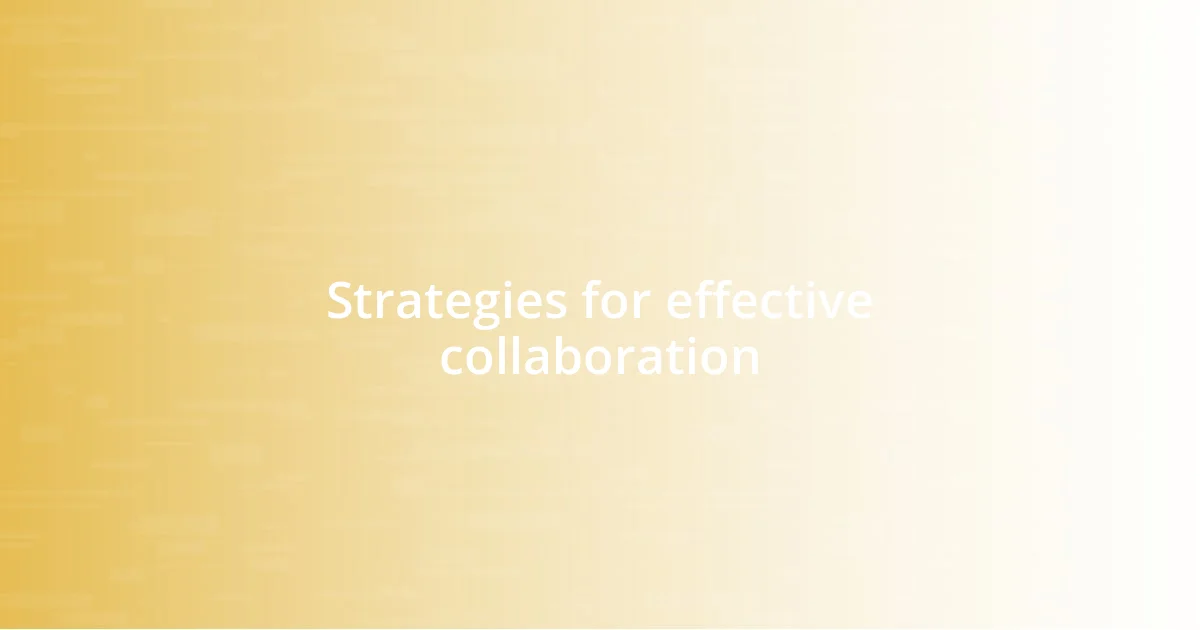
Strategies for effective collaboration
Collaborative efforts thrive on clear communication. During a particularly challenging project, I learned the hard way how vital it is to establish common ground early on. We had team members from different backgrounds, and I initially overlooked the importance of aligning our goals and expectations. After a miscommunication set us back, I realized that taking time to clarify our objectives and listening to each other’s perspectives created a much more cohesive and productive environment. Don’t you find that starting with clarity can eliminate a lot of potential headaches down the line?
Additionally, fostering a culture of trust is paramount. I once worked with a group where trust was lacking, and it stifled creativity. Many team members were hesitant to share their ideas out of fear of judgment. It struck me how much quicker we could have reached innovative solutions if everyone had felt safe to express their thoughts. I learned that investing time in team-building activities or even casual check-ins can develop the trust necessary for open dialogue. After all, don’t you agree that when we trust one another, we open up a world of possibilities?
Finally, embracing flexibility can make or break a collaboration. Let me share an experience: while working on a cross-functional team, unexpected changes in project direction challenged our original plans. At first, I was resistant, thinking, “How can we pivot again?” But as we adapted and brainstormed together, we uncovered new strengths within the team. It was an eye-opener on how agility can lead to innovative breakthroughs. Have you ever found yourself pleasantly surprised by the outcomes of a flexible approach? It’s rewarding to see how quickly a group can evolve when we let go of rigid plans and embrace the journey together.
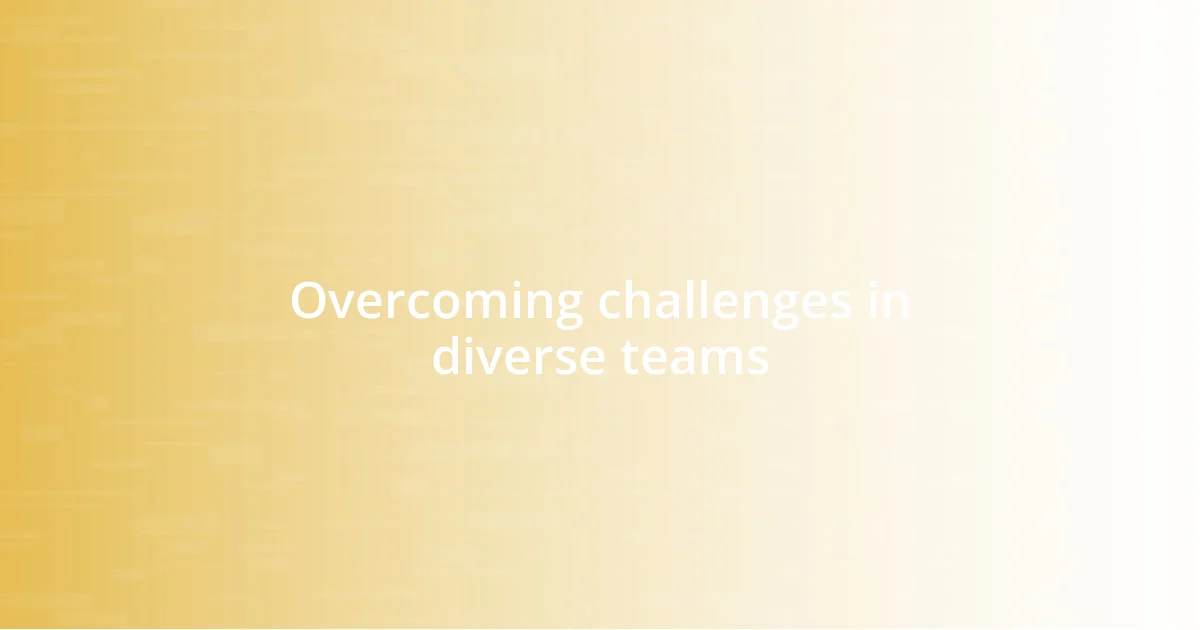
Overcoming challenges in diverse teams
Navigating the complexities of diverse teams can sometimes feel like untangling a knot. I remember a project where cultural misunderstandings initially led to friction among team members. Our differences felt like barriers rather than avenues for growth. However, as we sat together to discuss our various perspectives, it became clear that empathy transformed our interactions. By simply sharing our backgrounds and experiences, we built bridges instead of walls, and it was fascinating to see how mutual understanding cleared the air and sparked creativity.
Another challenge I encountered was the variation in communication styles within a team. There was one situation where a couple of colleagues preferred direct, succinct conversations, while others thrived in more elaborative discussions. This clash turned into confusion, and deadlines began to slip. Rather than letting frustration fester, we decided to hold a meeting to openly address our communication preferences. To my surprise, just bringing this issue to light led to a smoother flow of information. What I took away was the realization that acknowledging our differences is the first step toward harmonizing them. When have you turned a misunderstanding into a moment of clarity?
Lastly, I learned that embracing conflict can actually be a powerful catalyst for innovation. There was a time when differing opinions on our project’s direction led to heated discussions. Instead of shying away, I actively encouraged my team to bring their opinions to the forefront. To my astonishment, those discussions, while uncomfortable, birthed some of our most innovative ideas. I came to understand that when we view conflict as an opportunity rather than a setback, we allow ourselves—and our teams—to thrive. Isn’t it amazing how overcoming challenges together can forge stronger connections and lead to success?
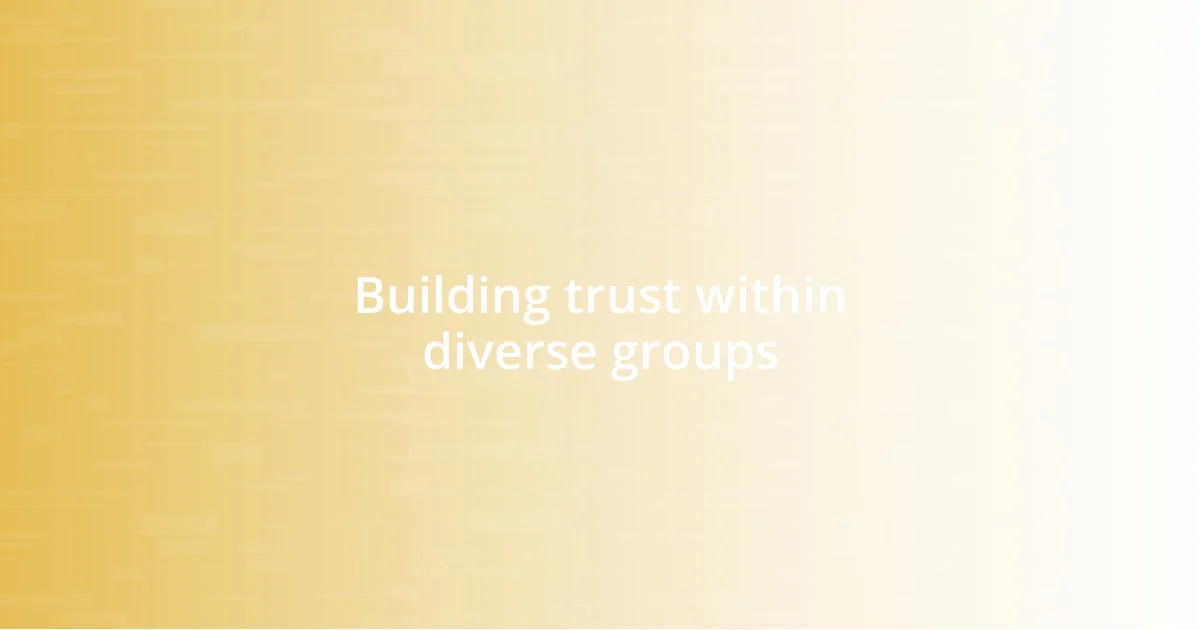
Building trust within diverse groups
Establishing trust within diverse groups is an intricate process that often requires intentional effort. I vividly recall an instance when I joined a project team where everyone was hesitant to share their ideas. The air felt thick with uncertainty, and it was uncomfortable. I decided to take the initiative by sharing a personal story about my own struggles with vulnerability in previous teams. Surprisingly, that simple act encouraged others to open up, leading to a profound realization: when we show our authentic selves, we not only create a safe space but also foster connections that enrich our collaboration. Have you ever found that sharing a little of yourself can bring others together?
One significant lesson I’ve learned is the impact of consistency in building trust. I once worked alongside a colleague who made it a point to follow up with team members regularly, checking in on both project progress and personal well-being. Over time, I noticed how this consistency cultivated a genuine feeling of accountability and connection. It made us all feel valued, and as a result, we were motivated to mirror that behavior. Isn’t it fascinating how small, consistent actions can lead to deeper trust within a group?
Moreover, I believe transparency holds a crucial position in trust-building. Early in my career, I worked on a project where, due to a lack of clarity about one member’s responsibilities, confusion soon escalated into blame. I remember how frustrating it felt, with everyone pointing fingers instead of collaboratively solving the issue. This experience taught me the value of openly discussing each person’s roles and contributions from the very beginning. Now, I always advocate for transparent project updates—there’s something liberating about knowing where everyone stands, wouldn’t you agree? It paves the way for open dialogue and mutual respect, which are fundamental for nurturing trust.










